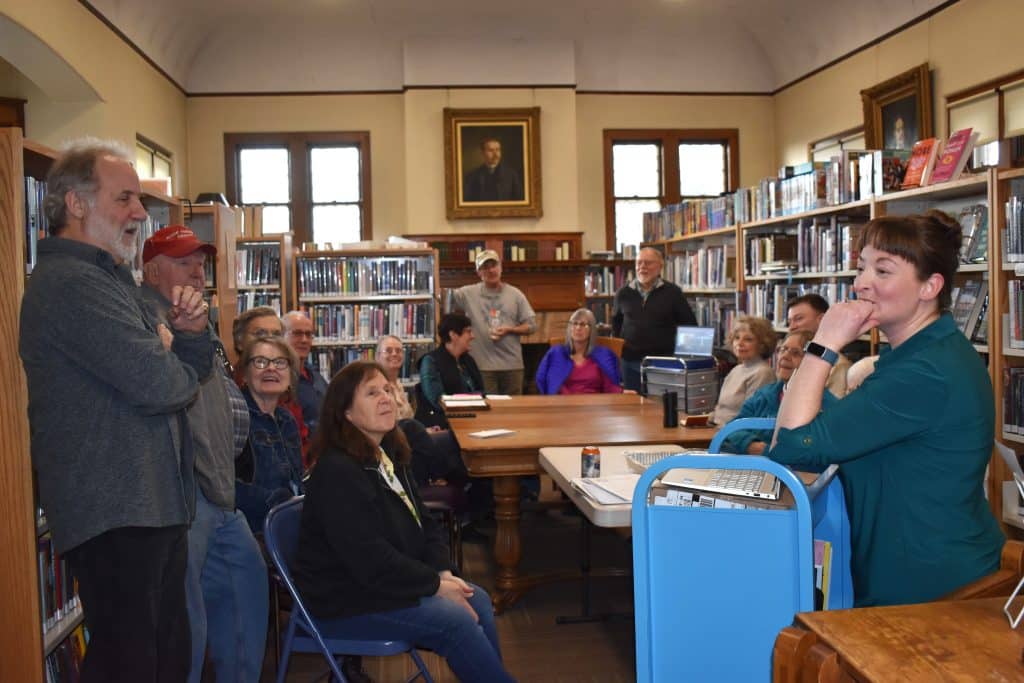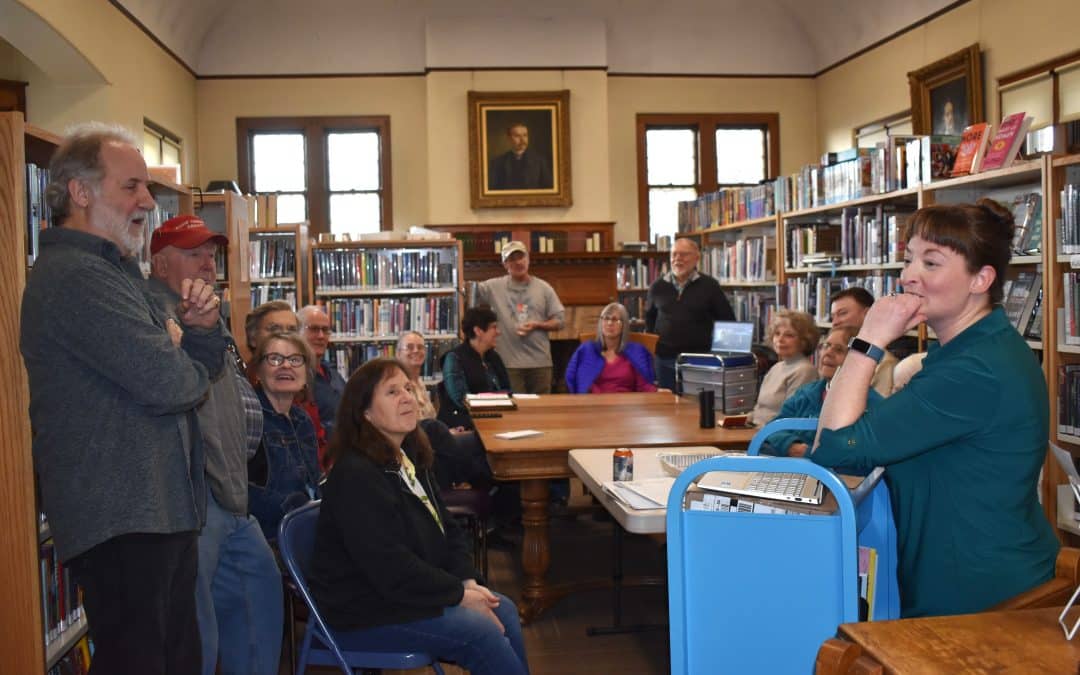BLANDFORD — On the Special Town Meeting warrant of March 18 was a vote to move forward with a grant application for an expansion of the Porter Memorial Library, a step that library director Nicole Daviau said the town has been waiting for five years to take.
“Every year for the past five years, the town has put $25,000 per year into a library stabilization fund,” she said.
The vote would allow the library to use $120,000 from the fund, plus an additional $30,000 from free cash, to be expended as the local match for a grant from the Massachusetts Public Library Construction program to be used for library assessment, planning, feasibility and design, the first part of the process.

Reminder Publishing photo by Amy Porter
The state will pay $125,000 for the planning portion of the grant. Daviau said a total of $150,000 from the town was needed in case there are issues with the site, “in order to hit the ground running.”
Porter Memorial Library does not currently meet with the fire code, having only one egress, nor the Americans with Disabilities Act, having no handicap-accessible entry or bathroom facilities. While the 130-year-old building is grandfathered in, Daviau said these and other needs, including more space, must be addressed.
The long-term goal is to develop the plans for an expansion, and submit them to the Massachusetts Board of Library Commissioners for a construction grant.
“We have extreme support. Everybody that I’ve spoken to is extremely supportive,” Daviau said correctly before the Town Meeting vote, which passed unanimously with no discussion from the 46 residents in attendance.
The support was also evident at a standing-room-only informational meeting at the library the week before the vote, at which Andrea Buon-Bunker and Heather Backman of the MBLC were online to answer questions about the grant process.
“It is a small library, and we don’t have a lot of resources for space,” Daviau said apologetically to the crowd.
The MBLC representatives said the application for the small population library grant, one of four tiers of funding in the program, is due May 31. Site visits will be made over the summer,and in September, the commission will recommend two projects from each tier for immediate funding, and one from each tier to be waitlisted for future funding.
All funded projects will go immediately into planning and design. In the first phase, the town will hire an owner’s project manager, who will help prepare bids for an architect. A feasibility study will be undertaken, then a design produced, somewhere between conceptual and schematic. Required for the application were the certified votes from the town.
A building committee composed of people from municipal finance, the librarian, a construction professional and an MBLC staff person will work with the project manager and architect during the planning stage, and there will be many chances for community input.
“The people designing this are specialists, chosen for library specialty, which makes a huge difference,” Daviau said.
Backman said as part of the program, the MBLC normally requires a choice between two sites.
“We do recognize some towns do not have a second site option. In cases like that, they do ask for a list of land that is available,” she said.
Daviau said Blandford does not have any other potential library sites in view. She told the group that the MBLC wants to make sure there is no other option. The town will provide real estate scans they have done with the assistance of the appraiser.
“So far, we’ve found nothing,” she said.
The amount needed for the construction phase will be determined at the end of 2025, after the design goes through an independent review, and an estimate is done by an independent firm. The program’s construction grant will cover up to 75% of eligible costs. The MBLA representatives said there will be ineligible costs, which can be up to 20% of construction.
Examples of eligible costs include the owner’s project manager, handicap toilets, HVAC, underground infrastructure, handicap ramp and solar panels. Ineligible costs include fundraising, bonding, legal, moving, temporary quarters, paving, landscaping, furniture and technology
Daviau said there will be another vote on construction funding. Blandford will get the maximum grant of 75%. She said normally 70% is covered, and up to 5% can be added based on a need factor, and Blandford has a high need factor.
The cost of the project will depend on the design. Daviau said the town could save money by expanding its current library, as opposed to building something entirely new.
Another option would be to design a “green” library, which could add 3% on top of the state grant. Blandford is likely not be eligible for the increased funding, however, because its economic need already places it at the maximum reimbursement of 75%, according to Buon-Bunker.
“We’re letting the town decide the cost, and will not be pursuing LEED,” Daviau said, referring to one of the green options. “The town is in control. Due to the size constraints of the lot, we won’t be building a huge library, and town growth is taken into consideration.”
She said the project planning looks ahead to Blandford’s library needs in the next 30 years.
“We’re asking you to have a building flexible enough to withstand changes,” said Buon-Bunker, who said she was the director of a library in the program that hadn’t been touched in 140 years.. “You will have a document that is community driven given to the architect.”
Asked how long the payment period would be, the MBLC representatives said it would be a local decision worked out with a bond company, but typically 20 to 25 years. The town may also work with the state Division of Local Services. On the application are three different options on financing for construction to begin in 2026.
Asked how the state will determine who is approved for the grant, they said the MBLC has received three applications from small-population libraries, and they expect all three projects to go into the planning and construction phase — one as a waitlisted project, which would be brought in as money becomes available.
“We have to address this, and have the state pay 75%,” Daviau said.


